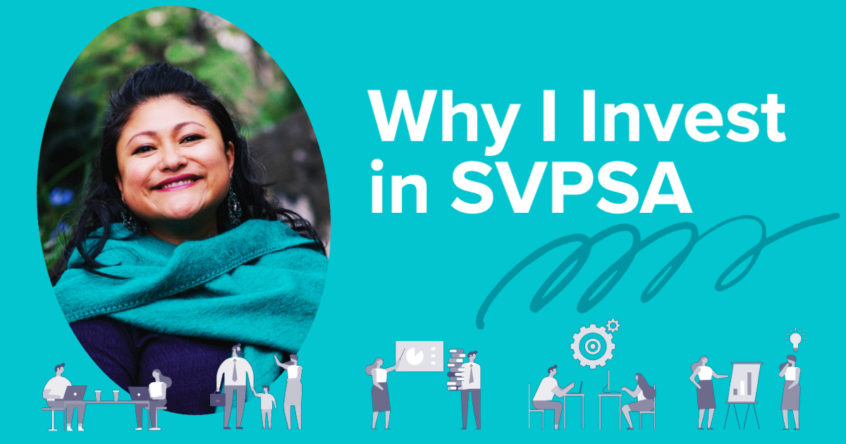Partner Spotlight: Erika Prosper
As a small business owner, Senior Director of Customer Insights for H-E-B, San Antonio’s First Lady, and a volunteer board member with countless local organizations, Erika Prosper is known for her tireless work supporting important causes and nonprofits in San Antonio. She says the reason she got involved with Social Venture Partners San Antonio was simple: because we need to engage more people – and especially more Hispanic people and people of color – in philanthropy.
“When you consider the changing demographics of this country, there is an impending crisis if we don’t start to motivate more people to engage with philanthropy,” Prosper says. “Within communities of color, philanthropy is often viewed within the context of the immediate family or neighborhood. And while that is important, I hope to widen the lens of philanthropy to help people think outside of the family nucleus.”
Erika is involved with SVPSA by volunteering her time for strategic planning sessions, as a presenter on data and analytics in the Fellowship, and on Catchafire, a portal for professionals to provide online consulting and support to nonprofits.
Prosper was drawn to SVPSA because it works as much more than just a grant-giving entity. She sees it as a private consulting firm of professionals who take on nonprofit clients pro bono, and then provide resources to get them to the next level.
“When I got into SVPSA, I started to understand that the goal wasn’t just about giving money, but helping nonprofits become better stewards of what they were given,” Prosper said. “I realized that this is a group of people working to improve the nonprofit world. It just surpassed my expectations and I’ve maintained membership because of that dual work.”
This year, she also helped write the curriculum for the metrics and measurements part of the Fellowship. In that session, nonprofit leaders were guided through a discussion about what nonprofits should know, questions they should ask, and tools they should use to collect and measure data. Because, as Prosper says, “no one wants to give a dollar without knowing exactly what the outcome will be with that gift.”
Often these Fellowship sessions are just as helpful to the SVP Partners as they are to the nonprofits. Prosper recalled a time when she and Tracy Wolff were asked to lead a discussion about fundraising. Tracy shared her perspective of managing a capital campaign, and Erika shared from the perspective of a business that gives away money.
“I loved hearing Tracy talk about her journey,” she continued. “SVPSA engages some of the most stellar professionals and retired professionals in San Antonio. Just listening, talking, watching, has been a great alternative form of career training for me. I love the opportunity to see how someone like Harriet Helmle, the godmother of SVPSA, approaches different problems.”
Prosper said she was impressed with the way SVPSA responded to the pandemic crisis in 2020 by introducing the local community to a new online tool called Catchafire (www.Catchafire.org) that could engage more people in volunteer work while also supporting local nonprofits in a broader way. This is the second year SVPSA has put together a group of funders to provide this tool at no cost to 125 San Antonio area nonprofits. Catchafire matches them with professional services at no cost. So far, the total value the nonprofits have gained to their bottom line is more than $980,000. This is money they save and helps nonprofits put their cash into reaching more people.
“That really demonstrated a global and a futuristic mentality,” she continued. “We are such a global society anyway, and with Catchafire, the same can be done with volunteering.”
Prosper sees Catchafire as a secret weapon to help maximize diversity and increase involvement. People can volunteer through Catchafire even without being a Partner with SVP, which will attract younger people who have been raised with a community service mindset, and those who may be used to only addressing immediate needs within their own family or community. She also sees Catchafire as a fantastic tool for businesses and those looking to progress in their careers.
“Employers are always looking for ways to retain and grow their talent,” she said. “Before, people progressed by being workaholics. We’re in an entirely new generation and people don’t see that as a badge of pride, they see it as a lifestyle that they don’t want. This generation is looking for ways to give back conveniently and in ways they see an immediate impact. As an employer, Catchafire creates a way to satisfy that desire while also enhancing their career path with you. It’s a leadership lab to practice those skills.”
She says Catchafire makes it easy because once a business leader creates a volunteer page, volunteer time will be automatically tracked, which takes the burden off HR and public affairs to manage the process. It also might inspire employees to expand their skills.
“A lot of people, especially women, think they should wait to volunteer until they feel like an ‘expert’ at something,” she said. “And I’ve met some pretty phenomenal people with talent who’ve been told to wait their turn. Catchafire creates incredible opportunities to practice skills and solve problems for nonprofits at the same time. It’s just a great way to do good in the world. Just look at all the types of problems you can help solve.”

